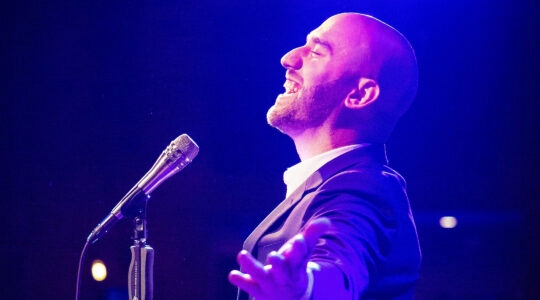Many Jews are still basking in the righteousness of our response to Kosovo. Not only did Jews race to assist Kosovo refugees, but it was “our” Holocaust and the command to “remember” that was President Clinton’s frequent war slogan. Jewish organizations took out full-page ads invoking the freight trains that took us to Auschwitz and were now taking Kosovars to … where? Correspondents depicted Kosovo refugees, particularly the smudge-faced young girls, as modern Anne Franks, quintessential innocents, as deserving of help as the Jews ever were.
Looking back, were we so flattered by all the Holocaust invocations that we allowed ourselves to be duped?
Was the Holocaust used as propaganda?
Yes, there were trains in Kosovo, and refugee girls with dirty faces. Wartime propaganda rarely is a
total lie but rather the distortion of images to manipulate the public and advance political interests. In a USA Today front-page story (July 1), the UN’s Paul Risley — a member of the war crimes tribunal — concluded, all in all, the portrayal of Kosovo as an inferno revealed nothing less than “a trip-up of the Western media and the Western governments.”
USA Today reports that “Many of the figures used by the Clinton administration and NATO to describe the wartime plight of Albanians in Kosovo now appear greatly exaggerated as allied forces take control of the province.”
“Yes, there were atrocities. But no, they don’t measure up to the advance billing,” says House intelligence chairman Rep. Porter Goss (R-Fla.).
According to USA Today, about 10,000 were killed, a slow week for a dozen other ethnic wars in this decade alone.
Well, explains a Pentagon spokesman, the best estimates were used at the time.
“In order to justify this thing, they needed to tap that memory of the Holocaust,” says Andrew Bacevich, professor of international relations at Boston University told USA Today.
You can’t beat the Holocaust as an argument, writes Tony Judt in The New Republic (July 19-26). “The Holocaust is now ubiquitous in American pedagogy and conversation.” It is “as much an argument as a memory … it is sufficient to name the reference to have made the case.”
At the very least, Michael Wines writes in The New York Times (June 13), Kosovo proves there is “a yawning gap between the West and much of the world on the value of a single life.”
Spare us the piety, writes Matthew Rothschild in The Progressive (June 17).
He points out that in Guatemala, “more than 100,000 peasants, Indians and political opponents” were killed, and there was no great rush from American citizens — let alone Jewish activists — to work in the refugee camps, giving tea and sympathy while posing for pictures. Where was the Holocaust imagery for Rwanda, El Salvador or the Kurds — all with many more dead than in Kosovo? The difference is that Washington wasn’t beating the war drums.
Henry Kissinger told England’s The Daily Telegraph (June 28) that he objected to “the appalling, oozing self-righteousness” that led Western do-gooders to believe that Kosovo was somehow a holier crusade than wars that came before.
Elie Wiesel in Tikkun (July-August) maintains: “The only interest the United States has in Kosovo is a moral interest, there are no other interests,” though he admitted he couldn’t read President Clinton’s mind. “Now, in terms of our failure to intervene elsewhere — I believe we should have intervened,” the Nobel laureate says.
Yes, says Kissinger in The Telegraph, but realistically, he asks, would we go to war against Russia in Chechnya, or against China in Tibet? “You’d say no. So where the hell do you do it? Only with very weak countries?”
So what was the lesson of Kosovo and the Holocaust if we won’t intervene against a country as strong as Germany?
The Holocaust analogy to Kosovo doesn’t even hold on the simplest level of ethnic cleansing. When NATO started bombing, says Kissinger, “it was not a war about ethnic cleansing at that point.” In the six months prior to NATO intervention there were cease-fires — and the Kosovo Liberation Army committed 80 percent of the cease-fire violations.
“If we had analyzed it correctly,” Kissinger says, “ we would have tried to strengthen the cease-fire and not put the entire blame on the Serbs.”
Now we see news articles about how the Kosovars poisoned Serb wells and raped Serbian woman before Milosevic sent in his brutal troops to defend Serbs living in Kosovo. With those troops gone, Kosovars are back to attacking every Serb and Gypsy.
Haaretz (July 2) reports that Eli Eliezri, representing the American Jewish Joint Distribution Committee, tells of civilian Serbs in Kosovo “being murdered in the streets and expelled from their homes.”
Good, you say? Not so fast. Eliezri says the average Kosovar identifies the Jews with the Serbs. He tells Haaretz that Jews “are being threatened all the time, and are being told that they need to vacate their homes and leave Kosovo or otherwise they will be killed.”
Now we really do have 1940s imagery: Jews are in trouble in a country that we helped so much. Nobody cares. The president is quiet. American Jews have other things on their minds. No one is in a hurry to have their photos taken with the fleeing Jews or to romanticize their sad story. The war is over. The dog was wagged.
The New York Jewish Week brings you the stories behind the headlines, keeping you connected to Jewish life in New York. Help sustain the reporting you trust by donating today.




